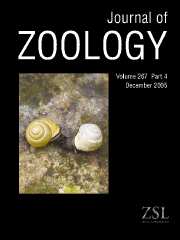Article contents
A population study of the dicrocoeliid trematode Paradistomum orientalis in the garden lizard Calotes versicolor
Published online by Cambridge University Press: 01 April 1998
Abstract
The population biology of Paradistomum orientalis, a dicrocoeliid trematode occurring in the gall bladder of the garden lizard Calotes versicolor, was investigated during 1991-1993. The prevalence and abundance of the fluke were high throughout the year and demonstrated no seasonal fluctuations. The maturation cycle of the fluke followed an annual pattern. The recruitment of the fluke was restricted to the period September to February, with a peak during September. Mature flukes occurred throughout the year, facilitating continuous release of eggs into the macroenvironment. Rainfall plays a major role in governing the maturation cycle, by regulating the population density of the snail host and the feeding activity of the definitive host. The frequency distribution of the fluke followed the overdispersion pattern, fitting the negative binomial model. There is no evidence for the existence of parasite-induced host mortality. On the other hand, competition for space and nutritive resources under crowded conditions serves as a major regulatory force and is the key factor responsible for maintaining the equilibrium of parasite densities during different months. The infrapopulation of the fluke remained stable over several years.
Keywords
- Type
- Research Article
- Information
- Copyright
- © 1998 The Zoological Society of London
- 3
- Cited by




